Restrictions on Freedom of Action
VerifiedAdded on 2019/12/04
|7
|2056
|245
Essay
AI Summary
A change in process raises a hindrance of consistency in the case- legislation. This situation seems to be even bigger as many national measures examined via the court from the viewpoint of the free action of items may also be dealt with as restrictions on the opposite freedoms of motion.
Contribute Materials
Your contribution can guide someone’s learning journey. Share your
documents today.
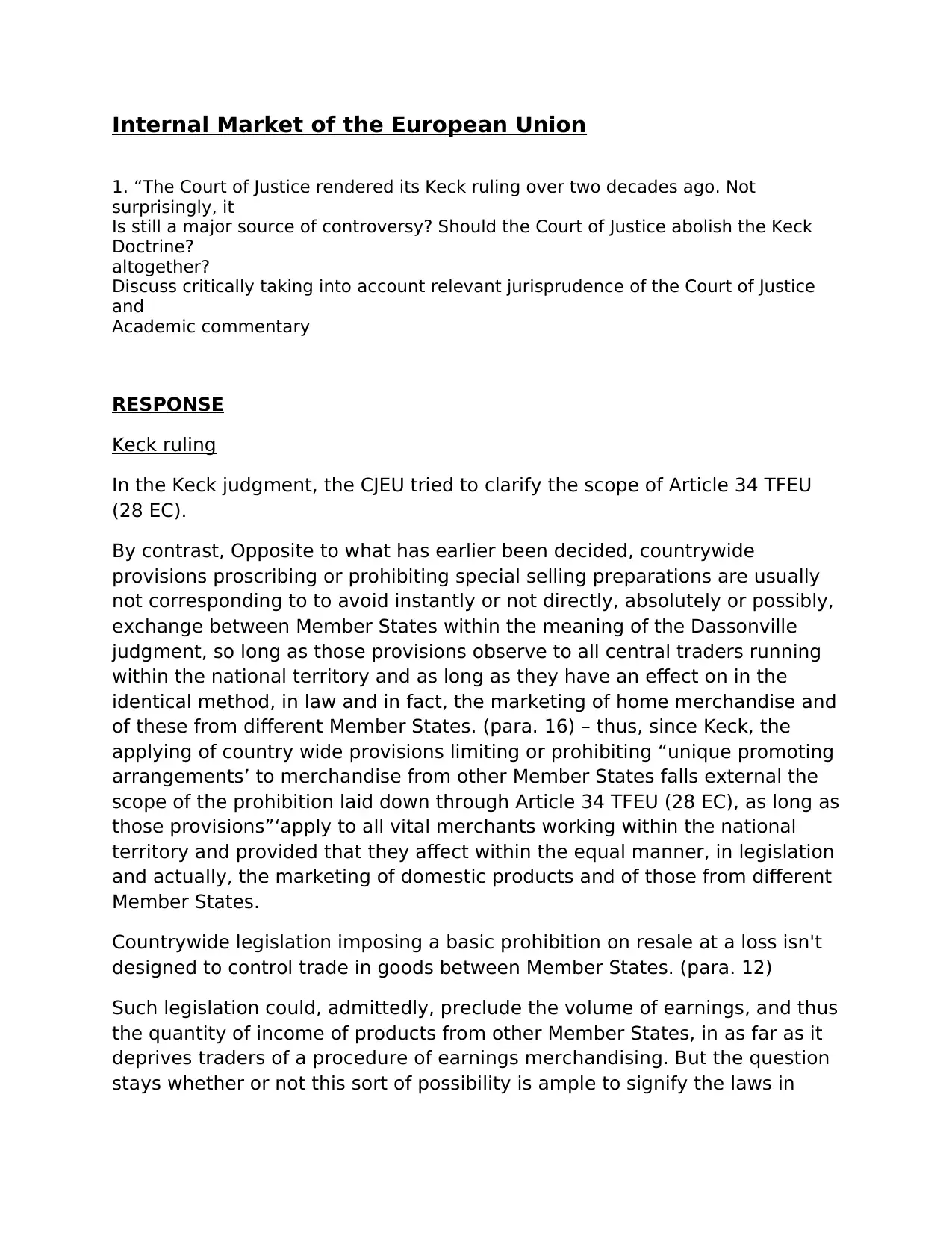
Internal Market of the European Union
1. “The Court of Justice rendered its Keck ruling over two decades ago. Not
surprisingly, it
Is still a major source of controversy? Should the Court of Justice abolish the Keck
Doctrine?
altogether?
Discuss critically taking into account relevant jurisprudence of the Court of Justice
and
Academic commentary
RESPONSE
Keck ruling
In the Keck judgment, the CJEU tried to clarify the scope of Article 34 TFEU
(28 EC).
By contrast, Opposite to what has earlier been decided, countrywide
provisions proscribing or prohibiting special selling preparations are usually
not corresponding to to avoid instantly or not directly, absolutely or possibly,
exchange between Member States within the meaning of the Dassonville
judgment, so long as those provisions observe to all central traders running
within the national territory and as long as they have an effect on in the
identical method, in law and in fact, the marketing of home merchandise and
of these from different Member States. (para. 16) – thus, since Keck, the
applying of country wide provisions limiting or prohibiting “unique promoting
arrangements’ to merchandise from other Member States falls external the
scope of the prohibition laid down through Article 34 TFEU (28 EC), as long as
those provisions”‘apply to all vital merchants working within the national
territory and provided that they affect within the equal manner, in legislation
and actually, the marketing of domestic products and of those from different
Member States.
Countrywide legislation imposing a basic prohibition on resale at a loss isn't
designed to control trade in goods between Member States. (para. 12)
Such legislation could, admittedly, preclude the volume of earnings, and thus
the quantity of income of products from other Member States, in as far as it
deprives traders of a procedure of earnings merchandising. But the question
stays whether or not this sort of possibility is ample to signify the laws in
1. “The Court of Justice rendered its Keck ruling over two decades ago. Not
surprisingly, it
Is still a major source of controversy? Should the Court of Justice abolish the Keck
Doctrine?
altogether?
Discuss critically taking into account relevant jurisprudence of the Court of Justice
and
Academic commentary
RESPONSE
Keck ruling
In the Keck judgment, the CJEU tried to clarify the scope of Article 34 TFEU
(28 EC).
By contrast, Opposite to what has earlier been decided, countrywide
provisions proscribing or prohibiting special selling preparations are usually
not corresponding to to avoid instantly or not directly, absolutely or possibly,
exchange between Member States within the meaning of the Dassonville
judgment, so long as those provisions observe to all central traders running
within the national territory and as long as they have an effect on in the
identical method, in law and in fact, the marketing of home merchandise and
of these from different Member States. (para. 16) – thus, since Keck, the
applying of country wide provisions limiting or prohibiting “unique promoting
arrangements’ to merchandise from other Member States falls external the
scope of the prohibition laid down through Article 34 TFEU (28 EC), as long as
those provisions”‘apply to all vital merchants working within the national
territory and provided that they affect within the equal manner, in legislation
and actually, the marketing of domestic products and of those from different
Member States.
Countrywide legislation imposing a basic prohibition on resale at a loss isn't
designed to control trade in goods between Member States. (para. 12)
Such legislation could, admittedly, preclude the volume of earnings, and thus
the quantity of income of products from other Member States, in as far as it
deprives traders of a procedure of earnings merchandising. But the question
stays whether or not this sort of possibility is ample to signify the laws in
Secure Best Marks with AI Grader
Need help grading? Try our AI Grader for instant feedback on your assignments.
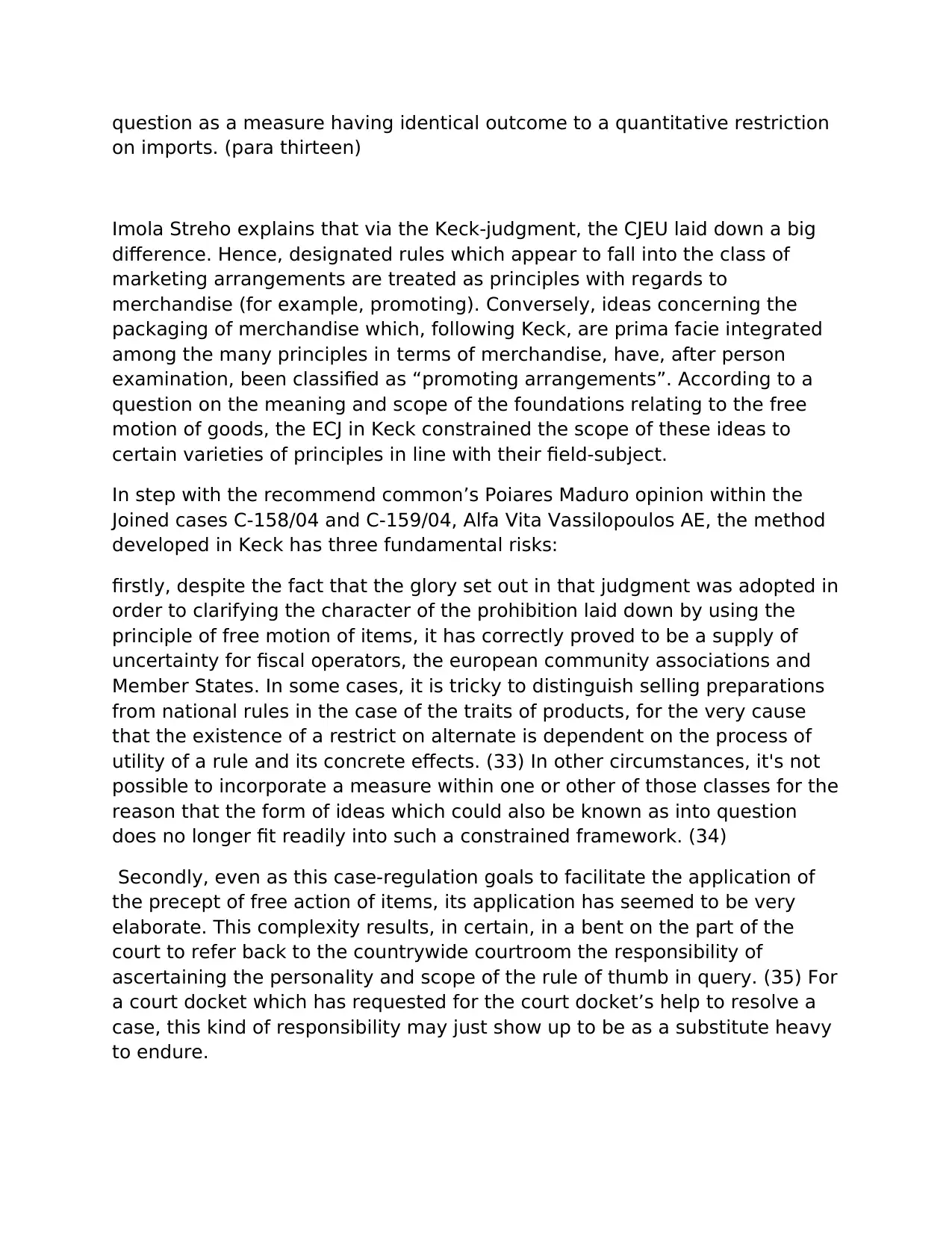
question as a measure having identical outcome to a quantitative restriction
on imports. (para thirteen)
Imola Streho explains that via the Keck-judgment, the CJEU laid down a big
difference. Hence, designated rules which appear to fall into the class of
marketing arrangements are treated as principles with regards to
merchandise (for example, promoting). Conversely, ideas concerning the
packaging of merchandise which, following Keck, are prima facie integrated
among the many principles in terms of merchandise, have, after person
examination, been classified as “promoting arrangements”. According to a
question on the meaning and scope of the foundations relating to the free
motion of goods, the ECJ in Keck constrained the scope of these ideas to
certain varieties of principles in line with their field-subject.
In step with the recommend common’s Poiares Maduro opinion within the
Joined cases C-158/04 and C-159/04, Alfa Vita Vassilopoulos AE, the method
developed in Keck has three fundamental risks:
firstly, despite the fact that the glory set out in that judgment was adopted in
order to clarifying the character of the prohibition laid down by using the
principle of free motion of items, it has correctly proved to be a supply of
uncertainty for fiscal operators, the european community associations and
Member States. In some cases, it is tricky to distinguish selling preparations
from national rules in the case of the traits of products, for the very cause
that the existence of a restrict on alternate is dependent on the process of
utility of a rule and its concrete effects. (33) In other circumstances, it's not
possible to incorporate a measure within one or other of those classes for the
reason that the form of ideas which could also be known as into question
does no longer fit readily into such a constrained framework. (34)
Secondly, even as this case-regulation goals to facilitate the application of
the precept of free action of items, its application has seemed to be very
elaborate. This complexity results, in certain, in a bent on the part of the
court to refer back to the countrywide courtroom the responsibility of
ascertaining the personality and scope of the rule of thumb in query. (35) For
a court docket which has requested for the court docket’s help to resolve a
case, this kind of responsibility may just show up to be as a substitute heavy
to endure.
on imports. (para thirteen)
Imola Streho explains that via the Keck-judgment, the CJEU laid down a big
difference. Hence, designated rules which appear to fall into the class of
marketing arrangements are treated as principles with regards to
merchandise (for example, promoting). Conversely, ideas concerning the
packaging of merchandise which, following Keck, are prima facie integrated
among the many principles in terms of merchandise, have, after person
examination, been classified as “promoting arrangements”. According to a
question on the meaning and scope of the foundations relating to the free
motion of goods, the ECJ in Keck constrained the scope of these ideas to
certain varieties of principles in line with their field-subject.
In step with the recommend common’s Poiares Maduro opinion within the
Joined cases C-158/04 and C-159/04, Alfa Vita Vassilopoulos AE, the method
developed in Keck has three fundamental risks:
firstly, despite the fact that the glory set out in that judgment was adopted in
order to clarifying the character of the prohibition laid down by using the
principle of free motion of items, it has correctly proved to be a supply of
uncertainty for fiscal operators, the european community associations and
Member States. In some cases, it is tricky to distinguish selling preparations
from national rules in the case of the traits of products, for the very cause
that the existence of a restrict on alternate is dependent on the process of
utility of a rule and its concrete effects. (33) In other circumstances, it's not
possible to incorporate a measure within one or other of those classes for the
reason that the form of ideas which could also be known as into question
does no longer fit readily into such a constrained framework. (34)
Secondly, even as this case-regulation goals to facilitate the application of
the precept of free action of items, its application has seemed to be very
elaborate. This complexity results, in certain, in a bent on the part of the
court to refer back to the countrywide courtroom the responsibility of
ascertaining the personality and scope of the rule of thumb in query. (35) For
a court docket which has requested for the court docket’s help to resolve a
case, this kind of responsibility may just show up to be as a substitute heavy
to endure.
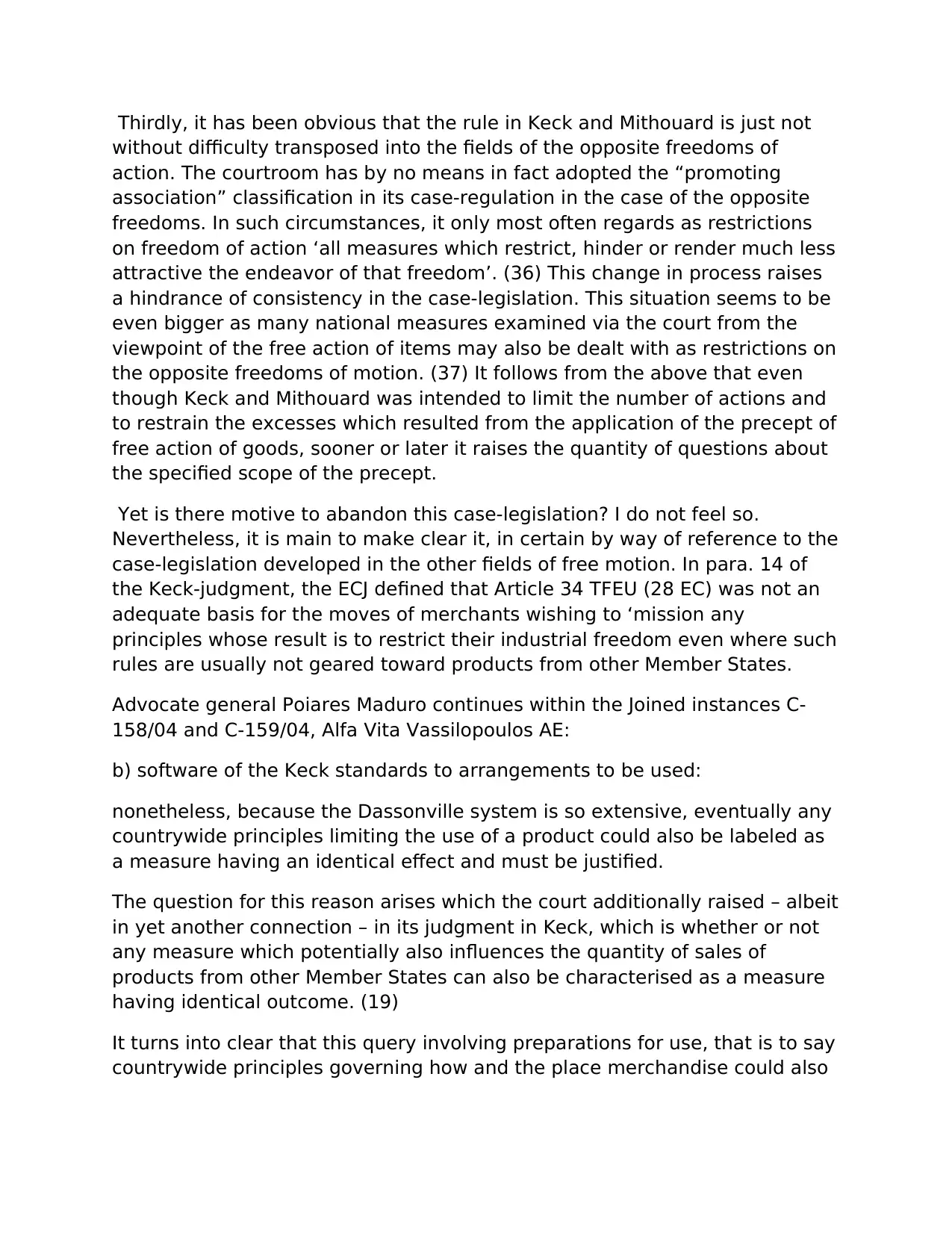
Thirdly, it has been obvious that the rule in Keck and Mithouard is just not
without difficulty transposed into the fields of the opposite freedoms of
action. The courtroom has by no means in fact adopted the “promoting
association” classification in its case-regulation in the case of the opposite
freedoms. In such circumstances, it only most often regards as restrictions
on freedom of action ‘all measures which restrict, hinder or render much less
attractive the endeavor of that freedom’. (36) This change in process raises
a hindrance of consistency in the case-legislation. This situation seems to be
even bigger as many national measures examined via the court from the
viewpoint of the free action of items may also be dealt with as restrictions on
the opposite freedoms of motion. (37) It follows from the above that even
though Keck and Mithouard was intended to limit the number of actions and
to restrain the excesses which resulted from the application of the precept of
free action of goods, sooner or later it raises the quantity of questions about
the specified scope of the precept.
Yet is there motive to abandon this case-legislation? I do not feel so.
Nevertheless, it is main to make clear it, in certain by way of reference to the
case-legislation developed in the other fields of free motion. In para. 14 of
the Keck-judgment, the ECJ defined that Article 34 TFEU (28 EC) was not an
adequate basis for the moves of merchants wishing to ‘mission any
principles whose result is to restrict their industrial freedom even where such
rules are usually not geared toward products from other Member States.
Advocate general Poiares Maduro continues within the Joined instances C-
158/04 and C-159/04, Alfa Vita Vassilopoulos AE:
b) software of the Keck standards to arrangements to be used:
nonetheless, because the Dassonville system is so extensive, eventually any
countrywide principles limiting the use of a product could also be labeled as
a measure having an identical effect and must be justified.
The question for this reason arises which the court additionally raised – albeit
in yet another connection – in its judgment in Keck, which is whether or not
any measure which potentially also influences the quantity of sales of
products from other Member States can also be characterised as a measure
having identical outcome. (19)
It turns into clear that this query involving preparations for use, that is to say
countrywide principles governing how and the place merchandise could also
without difficulty transposed into the fields of the opposite freedoms of
action. The courtroom has by no means in fact adopted the “promoting
association” classification in its case-regulation in the case of the opposite
freedoms. In such circumstances, it only most often regards as restrictions
on freedom of action ‘all measures which restrict, hinder or render much less
attractive the endeavor of that freedom’. (36) This change in process raises
a hindrance of consistency in the case-legislation. This situation seems to be
even bigger as many national measures examined via the court from the
viewpoint of the free action of items may also be dealt with as restrictions on
the opposite freedoms of motion. (37) It follows from the above that even
though Keck and Mithouard was intended to limit the number of actions and
to restrain the excesses which resulted from the application of the precept of
free action of goods, sooner or later it raises the quantity of questions about
the specified scope of the precept.
Yet is there motive to abandon this case-legislation? I do not feel so.
Nevertheless, it is main to make clear it, in certain by way of reference to the
case-legislation developed in the other fields of free motion. In para. 14 of
the Keck-judgment, the ECJ defined that Article 34 TFEU (28 EC) was not an
adequate basis for the moves of merchants wishing to ‘mission any
principles whose result is to restrict their industrial freedom even where such
rules are usually not geared toward products from other Member States.
Advocate general Poiares Maduro continues within the Joined instances C-
158/04 and C-159/04, Alfa Vita Vassilopoulos AE:
b) software of the Keck standards to arrangements to be used:
nonetheless, because the Dassonville system is so extensive, eventually any
countrywide principles limiting the use of a product could also be labeled as
a measure having an identical effect and must be justified.
The question for this reason arises which the court additionally raised – albeit
in yet another connection – in its judgment in Keck, which is whether or not
any measure which potentially also influences the quantity of sales of
products from other Member States can also be characterised as a measure
having identical outcome. (19)
It turns into clear that this query involving preparations for use, that is to say
countrywide principles governing how and the place merchandise could also
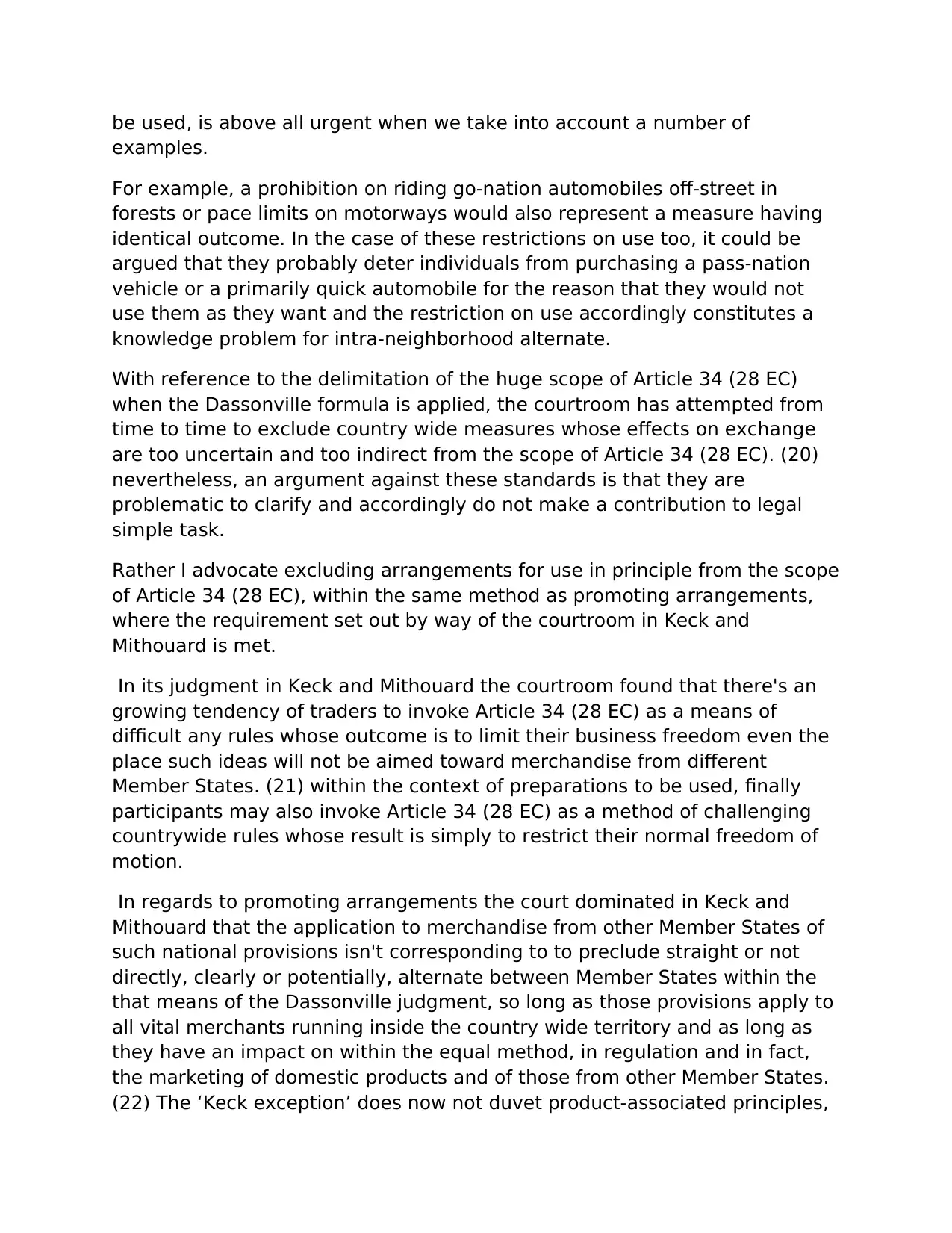
be used, is above all urgent when we take into account a number of
examples.
For example, a prohibition on riding go-nation automobiles off-street in
forests or pace limits on motorways would also represent a measure having
identical outcome. In the case of these restrictions on use too, it could be
argued that they probably deter individuals from purchasing a pass-nation
vehicle or a primarily quick automobile for the reason that they would not
use them as they want and the restriction on use accordingly constitutes a
knowledge problem for intra-neighborhood alternate.
With reference to the delimitation of the huge scope of Article 34 (28 EC)
when the Dassonville formula is applied, the courtroom has attempted from
time to time to exclude country wide measures whose effects on exchange
are too uncertain and too indirect from the scope of Article 34 (28 EC). (20)
nevertheless, an argument against these standards is that they are
problematic to clarify and accordingly do not make a contribution to legal
simple task.
Rather I advocate excluding arrangements for use in principle from the scope
of Article 34 (28 EC), within the same method as promoting arrangements,
where the requirement set out by way of the courtroom in Keck and
Mithouard is met.
In its judgment in Keck and Mithouard the courtroom found that there's an
growing tendency of traders to invoke Article 34 (28 EC) as a means of
difficult any rules whose outcome is to limit their business freedom even the
place such ideas will not be aimed toward merchandise from different
Member States. (21) within the context of preparations to be used, finally
participants may also invoke Article 34 (28 EC) as a method of challenging
countrywide rules whose result is simply to restrict their normal freedom of
motion.
In regards to promoting arrangements the court dominated in Keck and
Mithouard that the application to merchandise from other Member States of
such national provisions isn't corresponding to to preclude straight or not
directly, clearly or potentially, alternate between Member States within the
that means of the Dassonville judgment, so long as those provisions apply to
all vital merchants running inside the country wide territory and as long as
they have an impact on within the equal method, in regulation and in fact,
the marketing of domestic products and of those from other Member States.
(22) The ‘Keck exception’ does now not duvet product-associated principles,
examples.
For example, a prohibition on riding go-nation automobiles off-street in
forests or pace limits on motorways would also represent a measure having
identical outcome. In the case of these restrictions on use too, it could be
argued that they probably deter individuals from purchasing a pass-nation
vehicle or a primarily quick automobile for the reason that they would not
use them as they want and the restriction on use accordingly constitutes a
knowledge problem for intra-neighborhood alternate.
With reference to the delimitation of the huge scope of Article 34 (28 EC)
when the Dassonville formula is applied, the courtroom has attempted from
time to time to exclude country wide measures whose effects on exchange
are too uncertain and too indirect from the scope of Article 34 (28 EC). (20)
nevertheless, an argument against these standards is that they are
problematic to clarify and accordingly do not make a contribution to legal
simple task.
Rather I advocate excluding arrangements for use in principle from the scope
of Article 34 (28 EC), within the same method as promoting arrangements,
where the requirement set out by way of the courtroom in Keck and
Mithouard is met.
In its judgment in Keck and Mithouard the courtroom found that there's an
growing tendency of traders to invoke Article 34 (28 EC) as a means of
difficult any rules whose outcome is to limit their business freedom even the
place such ideas will not be aimed toward merchandise from different
Member States. (21) within the context of preparations to be used, finally
participants may also invoke Article 34 (28 EC) as a method of challenging
countrywide rules whose result is simply to restrict their normal freedom of
motion.
In regards to promoting arrangements the court dominated in Keck and
Mithouard that the application to merchandise from other Member States of
such national provisions isn't corresponding to to preclude straight or not
directly, clearly or potentially, alternate between Member States within the
that means of the Dassonville judgment, so long as those provisions apply to
all vital merchants running inside the country wide territory and as long as
they have an impact on within the equal method, in regulation and in fact,
the marketing of domestic products and of those from other Member States.
(22) The ‘Keck exception’ does now not duvet product-associated principles,
Secure Best Marks with AI Grader
Need help grading? Try our AI Grader for instant feedback on your assignments.

which relate to the traits of merchandise. (23) The judgment in Keck and
Mithouard involved the prohibition on selling goods beneath the purchase
rate. Following that judgment the court has for illustration categorized
prohibitions on Sunday buying and selling and the prohibition on any
individual instead of notably authorized outlets promoting tobacco as
provisions on promoting arrangements. (24)
The final result of this case-legislation is that countrywide ideas which fulfill
the selling arrangement criterion do not fall inside the scope of Article 28 EC
with the effect that they are permissible underneath group legislation with
out the necessity for the Member State to justify them. In contrast history
the reward case now gives grounds to don't forget whether preparations to
be used should not, by using analogy with the court docket’s ruling in Keck,
be excluded from the scope of Article 34 (28 EC). If we remember the traits
of preparations for use and promoting arrangements, it's clear that they are
comparable in terms of the character and the intensity of their effects on
alternate in items.
Promoting arrangements apply in precept most effective after a product has
been imported. In addition, they not directly affect the advertising of a
product by means of shoppers, for instance seeing that they can not buy the
product on precise days of the week or promoting for a product is discipline
to restrictions. Arrangements to be used additionally impact the advertising
of a product most effective not directly by means of their results on the
buying behavior of consumers. Countrywide laws which governs
1
1Bibliography: lepo Case Keck. Available at: http://lepo.it.da.ut.ee/~yana/kaubad/case_keck.html (Accessed: 24
April 2016).
Bibliography:
Richard Chriss, Keck Considered: A New Doctrinal Model for the Free Movement of Goods in the European Union,
7 Pace Int'l L. Rev. 149 (1995) Available at: http://digitalcommons.pace.edu/pilr/vol7/iss1/5 (Accessed: 24 April
2016)
Mithouard involved the prohibition on selling goods beneath the purchase
rate. Following that judgment the court has for illustration categorized
prohibitions on Sunday buying and selling and the prohibition on any
individual instead of notably authorized outlets promoting tobacco as
provisions on promoting arrangements. (24)
The final result of this case-legislation is that countrywide ideas which fulfill
the selling arrangement criterion do not fall inside the scope of Article 28 EC
with the effect that they are permissible underneath group legislation with
out the necessity for the Member State to justify them. In contrast history
the reward case now gives grounds to don't forget whether preparations to
be used should not, by using analogy with the court docket’s ruling in Keck,
be excluded from the scope of Article 34 (28 EC). If we remember the traits
of preparations for use and promoting arrangements, it's clear that they are
comparable in terms of the character and the intensity of their effects on
alternate in items.
Promoting arrangements apply in precept most effective after a product has
been imported. In addition, they not directly affect the advertising of a
product by means of shoppers, for instance seeing that they can not buy the
product on precise days of the week or promoting for a product is discipline
to restrictions. Arrangements to be used additionally impact the advertising
of a product most effective not directly by means of their results on the
buying behavior of consumers. Countrywide laws which governs
1
1Bibliography: lepo Case Keck. Available at: http://lepo.it.da.ut.ee/~yana/kaubad/case_keck.html (Accessed: 24
April 2016).
Bibliography:
Richard Chriss, Keck Considered: A New Doctrinal Model for the Free Movement of Goods in the European Union,
7 Pace Int'l L. Rev. 149 (1995) Available at: http://digitalcommons.pace.edu/pilr/vol7/iss1/5 (Accessed: 24 April
2016)

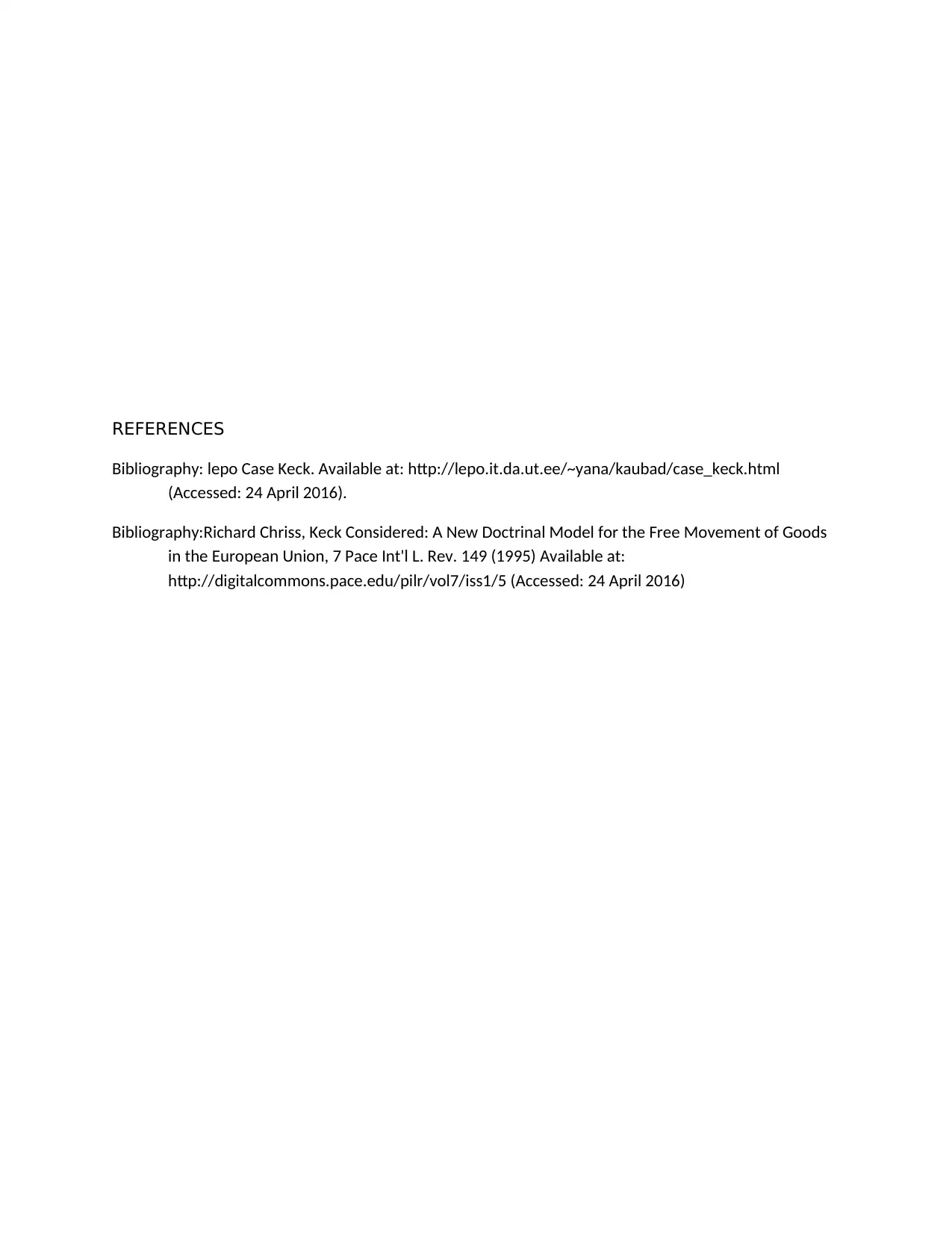
REFERENCES
Bibliography: lepo Case Keck. Available at: http://lepo.it.da.ut.ee/~yana/kaubad/case_keck.html
(Accessed: 24 April 2016).
Bibliography:Richard Chriss, Keck Considered: A New Doctrinal Model for the Free Movement of Goods
in the European Union, 7 Pace Int'l L. Rev. 149 (1995) Available at:
http://digitalcommons.pace.edu/pilr/vol7/iss1/5 (Accessed: 24 April 2016)
Bibliography: lepo Case Keck. Available at: http://lepo.it.da.ut.ee/~yana/kaubad/case_keck.html
(Accessed: 24 April 2016).
Bibliography:Richard Chriss, Keck Considered: A New Doctrinal Model for the Free Movement of Goods
in the European Union, 7 Pace Int'l L. Rev. 149 (1995) Available at:
http://digitalcommons.pace.edu/pilr/vol7/iss1/5 (Accessed: 24 April 2016)
1 out of 7
Your All-in-One AI-Powered Toolkit for Academic Success.
+13062052269
info@desklib.com
Available 24*7 on WhatsApp / Email
![[object Object]](/_next/static/media/star-bottom.7253800d.svg)
Unlock your academic potential
© 2024 | Zucol Services PVT LTD | All rights reserved.

